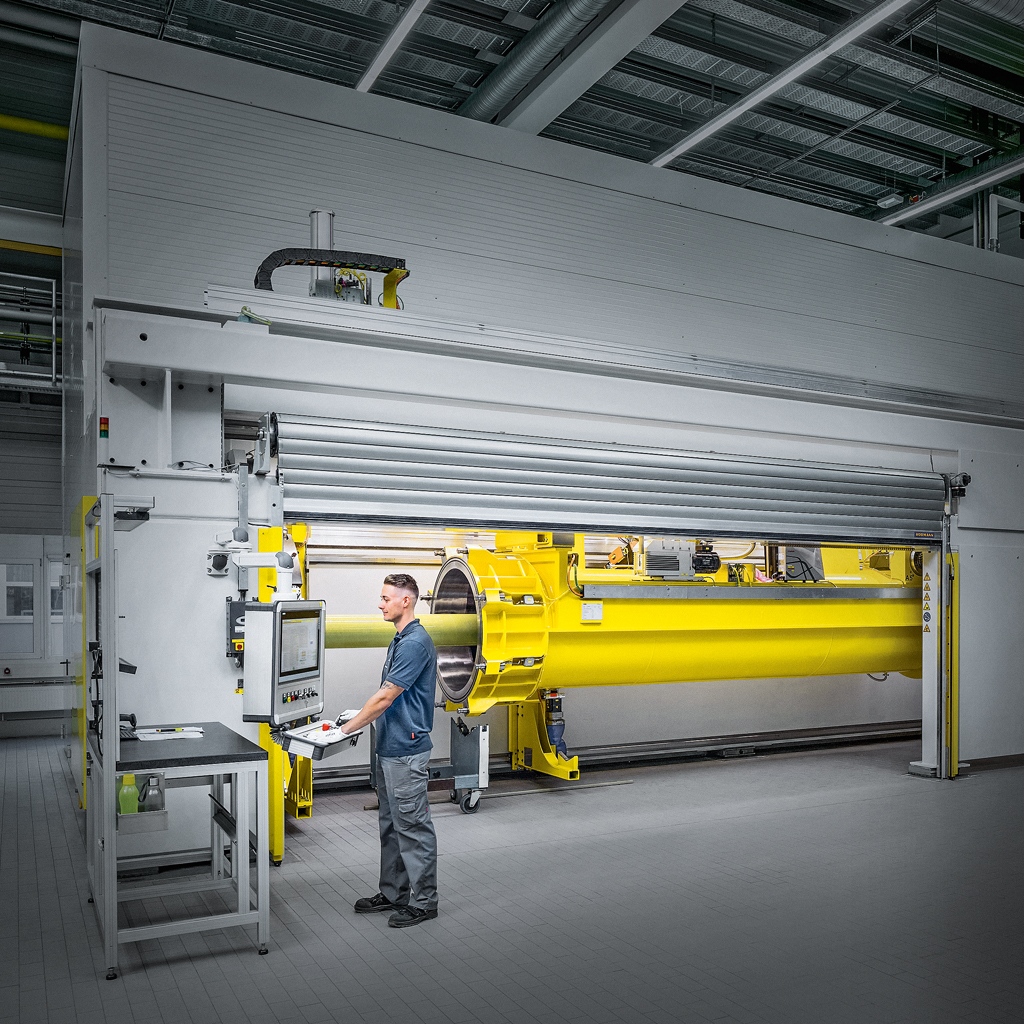A defective insulator in high-voltage applications can quickly lead to disaster. That’s why Reinhausen Power Composites (RPC) relies on the Pegasus test system – the only one of its kind in the world and a hundred times more accurate than the standard requires – to assess the quality of its products.
As if operated by an invisible hand, the handling system lifts the insulation tube from the transport trolley and carries it to the clamping device. Once the tube is fixed in place, the rolling shutter to the system, itself about the size of a garage, closes and inside, a test program is initiated – a sophisticated program which performs bending, pressure, and leakage tests as specified by the software. The system is called Pegasus and it is used to keep a close eye on the quality of the glass-fiber reinforced tubes and composite hollow insulators in the ReCoTec® range produced at Reinhausen Power Composites (RPC) in the German city of Regensburg.
“We’re the only manufacturer in the world with the option to carry out routine testing with such a high level of accuracy.“Marcus Hartmann, Executive Director Business Development at RPC
The whole process is carried out almost entirely automatically. The insulating tubes are only delivered to customers or, in the case of type testing, released for series production, if the test results are positive. Marcus Hartmann, Executive Director Business Development at RPC, affirms: “Our insulators are cornerstones of the high-voltage industry and the reliability of our equipment is paramount. We don’t want to leave a single thing to chance.”
Averting Disaster
The demands placed on insulators in high-voltage applications are enormous. If the insulators are not functioning correctly, the entire primary substation could go up in flames. Entire city districts would be left without electricity and people’s lives could even be put at risk. Because of this, insulators have to be built to withstand not only the decades’ worth of strain that is part and parcel of everyday grid operation, but also natural phenomena such as weathering and earthquakes.
This is why the energy industry has created standards outlining the strict requirements which insulators must meet. These standards cover mechanical resistance, tested in bending and pressure tests, as well as tightness. “What makes Pegasus so special is that it combines all three test procedures in one run,” explains Hartmann.
The vacuum chamber forms the heart of the Pegasus system. This is where the tightness of the insulating tubes is put to the test. This aspect is especially important, as the insulators are frequently filled with gas or oil which must not be allowed to escape under any circumstances. The test is crucial to ensure the safety of the product. “For us, it therefore wasn’t enough to simply meet the requirements of the standards – we wanted to surpass them,” says Hartmann. That’s why RPC opted for an extremely sensitive test procedure in which the insulator is filled with helium while it is in the vacuum.
Three in One Go
The Pegasus test system enables Reinhausen Power Composites (RPC) to carry out both type and series testing for insulators up to five meters in length. The following tests are carried out automatically in one go:
- Bend testing up to 100 kN
- Pressure testing with helium up to 25 bar
- Leakage testing with helium
More information on RPC’s insulators is available here.
Finely tuned sensors are then able to detect any tiny molecules of the noble gas that escape as a result of leakages. “The norm states that an insulator with a leakage rate of 10 ‑4 mbar*l/sec is tight. We, on the other hand, guarantee a tightness of 10 ‑6 mbar*l/sec. That’s a hundred times more accurate!” Once the test is complete, the helium is recovered via the pump station, first by being discharged into a balloon with a capacity of 40 cubic meters and then being recompressed using a compressor.
Intelligent Test Procedure
Another challenge to contend with during testing is the fact that not all insulators are the same. Each customer has their own specific requirements. While the mechanical load capacity might be the top priority for one customer, for another tightness might be paramount. “We manufacture our insulators according to our customers’ needs, but that means we also have to adjust our test parameters to match these individual requirements,” explains Hartmann.
Pegasus can do this automatically: So that the system knows what to do, it communicates via data transfer with SAP, which is where all the required parameters are stored. The test results are stored in an SQL database and are available for statistical evaluations. Hartmann is proud of the Pegasus system: “It’s the only system of its kind in the entire world that can perform tests with such a high level of accuracy.”
YOUR CONTACT
If you have any questions about products and test procedures used at RPC,
please contact Marcus Hartmann:
M.Hartmann@reinhausen.com
